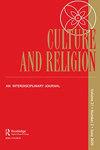Colin Kaepernick, Tim Tebow, and the magic of comparison: muscular Christianity as white racial frame
IF 0.5
0 RELIGION
引用次数: 0
Abstract
ABSTRACTThis article explores how muscular Christianity operates as a media frame for athlete religiosity and how the muscular Christian frame contributes to essentialist and racialised stereotypes about Black and white athletes, which in turn reinforce ‘common-sense’ assumptions around black and white religion that perpetuate and transmit white supremacist values. We present these findings starting from a critical comparative media analysis of athlete religiosity, articulated with respect to Colin Kaepernick and Tim Tebow. Our analysis produced two primary findings. First, while both Kaepernick and Tebow were framed as ‘muscular Christians’ by news media, this framing was racialised, constituting both athletes within what Feagin termed a ‘White racial frame’ (2013, 14). Second, the comparative media sub-discourse of a Kaepernick/Tebow comparison itself functioned to extend the white racial frame by essentializing Kaepernick’s protest as ‘Black Christian progressive’ action and dichotomising this as necessary and compatible with conservative white evangelicalism. The underlying ideas about muscular Christianity in these media representations are not neutral. Presupposing whiteness, they obscure the active construction of a white, masculine, (evangelical) Protestant religiosity against which other representations are measured, sometimes explicitly, but more often implicitly. The article concludes with implications for understanding the cultural politics of Kaepernick and Tebow, adding to extant ‘cultural backlash’ explanations.KEYWORDS: Colin KaepernickTim Tebowsport and religionmuscular Christianitymedia framing AcknowledgementThis article benefited greatly from discussions with Mark Hulsether, Rosalind Hackett, Steven Waller, and many former students at the University of Tennessee and Penn State Harrisburg. We also drew theoretical inspiration from the American Examples program at the University of Alabama. Any definciencies are our own.Disclosure statementNo potential conflict of interest was reported by the author(s).Notes1. We don’t intend this to be read as an indictment of Kaepernick’s protest, or the counter-hegemonic civil formations stoked by it. Rather, we are highlighting the fundamentally contested nature of these sorts of public visions and discourses and the ways that these are sometimes re-articulated.2. Some exceptions include Hawzen and Newman (Citation2017), Kusz (Citation2007), Newman and Giardina (Citation2011), and Thangaraj (2019) in sport studies. In religious studies, see Martin (Citation2018), Scholes (Citation2018, Scholes Citation2019a, Scholes Citation2019b), Smith (Citation2015), and Woodbine (Citation2015).3. See Appendix A for a list of media references cited in this article.4. We have intentionally chosen the more relational language of mentorship over the forensic language of ‘auditor’ as it better reflects the process of intellectual discussion and formation that took place.5. The Root does feature an article on Kaepernick as a role model for Black youth but does not connect Kaepernick’s character with religion.6. On the media framing of bi-racial and multi-racial athletes see Deeb and Love (Citation2018). One limitation of this article is the extent to which we work within the confines of the Black/white binary racialisation we observed in the pieces we examined.7. We could not locate a single article that linked to or cited Kaepernick in his own words stating that his protest was motivated by his faith. This does not mean that Kaepernick’s actions are not religiously motivated or that if they were they would somehow be suspect or less incisive. Nor does this detract from considerations of Kaepernick in the Black ‘prophetic’ tradition, like Scholes (Citation2018) does. Rather, our point is that like comparison, acts of classification, including classifying something as Christian or not, are political acts (McCutcheon Citation2005). Since we are primarily interested in media framing it seems worthwhile to consider how media pieces (mostly by white journalists) classify Kaepernick’s action as Christian in the face of limited evidence, and to what effect.科林·卡佩尼克,蒂姆·蒂博,以及比较的魔力:作为白人种族框架的强大基督教
摘要本文探讨了肌肉基督教如何作为运动员宗教信仰的媒体框架运作,以及肌肉基督教框架如何促成对黑人和白人运动员的本质主义和种族化刻板印象,这反过来又强化了围绕黑人和白人宗教的“常识性”假设,这些假设延续和传播了白人至上主义的价值观。我们从对运动员宗教信仰的批判性比较媒体分析开始,阐述了Colin Kaepernick和Tim Tebow的研究结果。我们的分析产生了两个主要发现。首先,虽然卡佩尼克和蒂博都被新闻媒体诬陷为“肌肉发达的基督徒”,但这种诬陷是种族化的,将这两位运动员都纳入了Feagin所说的“白人种族框架”(2013,14)。其次,Kaepernick/Tebow比较的比较媒体子话语本身通过将Kaepernick的抗议本质化为“黑人基督教进步”行动,并将其一分为二,认为这是必要的,与保守的白人福音主义兼容,从而扩展了白人种族框架。在这些媒体表现中,关于强大基督教的潜在观念并不是中立的。他们以白人为前提,模糊了白人、男性、(福音派)新教宗教信仰的积极建构,而其他表征有时是明确的,但更多的是含蓄的。文章总结了对理解Kaepernick和Tebow的文化政治的启示,并补充了现有的“文化反弹”解释。本文从与Mark Hulsether、Rosalind Hackett、Steven Waller以及许多以前在田纳西大学和宾夕法尼亚州立大学哈里斯堡分校的学生的讨论中受益匪浅。我们还从阿拉巴马大学的美国范例项目中获得了理论灵感。任何定义都是我们自己的。披露声明作者未报告潜在的利益冲突。我们不打算把这篇文章解读为对Kaepernick的抗议的控诉,或者是对反霸权的民间组织的控诉。相反,我们强调的是这些公共愿景和话语的根本争议性,以及它们有时被重新表述的方式。一些例外包括Hawzen和Newman (Citation2017), Kusz (Citation2007), Newman和Giardina (Citation2011),以及Thangaraj(2019)在体育研究方面。在宗教研究方面,参见Martin (Citation2018)、Scholes (Citation2018、Scholes Citation2019a、Scholes Citation2019b)、Smith (Citation2015)和Woodbine (Citation2015)。本文引用的媒体参考文献列表见附录A。我们有意选择了“导师”这一更具关系性的语言,而不是“审计师”这一法庭语言,因为它更好地反映了发生的智力讨论和形成的过程。The Root确实有一篇文章将Kaepernick作为黑人青年的榜样,但并没有将Kaepernick的性格与宗教联系起来。关于双种族和多种族运动员的媒体框架,请参阅Deeb和Love (Citation2018)。这篇文章的一个限制是我们在黑/白二元种族化的范围内工作的程度,我们在我们检查的片段中观察到。我们找不到一篇文章链接或引用Kaepernick自己的话,说他的抗议是出于他的信仰。这并不意味着Kaepernick的行为没有宗教动机,或者如果他们是宗教动机,他们就会受到怀疑或不那么敏锐。这也不会减损卡佩尼克在黑人“预言”传统中的考虑,就像斯科尔斯(Citation2018)那样。相反,我们的观点是,与比较一样,分类行为,包括将某物归类为基督徒或非基督徒,都是政治行为(McCutcheon Citation2005)。既然我们主要对媒体框架感兴趣,那么考虑一下媒体(主要是白人记者)如何在有限的证据面前将Kaepernick的行为归类为基督徒,以及产生了什么影响,似乎是值得的。
本文章由计算机程序翻译,如有差异,请以英文原文为准。
求助全文
约1分钟内获得全文
求助全文

 求助内容:
求助内容: 应助结果提醒方式:
应助结果提醒方式:


